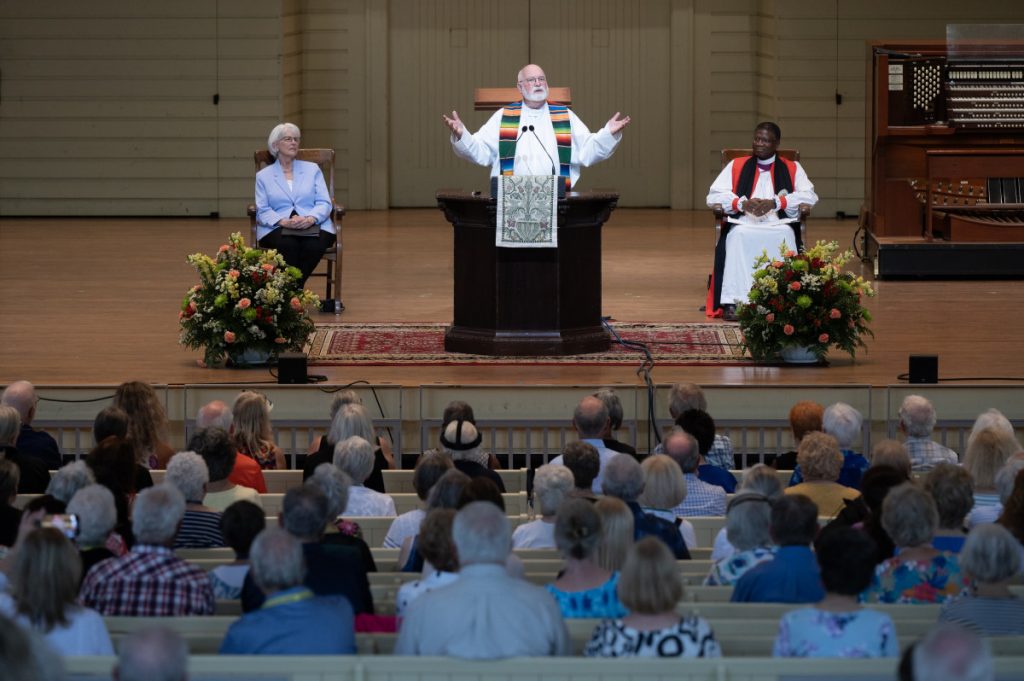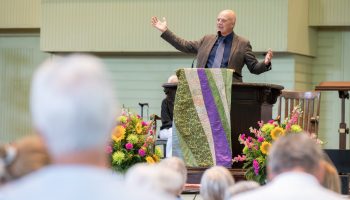
“I have been walking with the homies for 40 years, and every one of the 10,000 gang members must have my cell phone number. After I received the award at the White House, one of them called and said ‘I hear you got a presidential pardon or something,’ ” said, Fr. Gregory Boyle, S.J., at the 10:45 a.m. Sunday morning worship service in the Amphitheater.
His sermon title was “The Stillness in Charge,” and the scripture was Mark 4: 35-41, when Jesus calmed the storm on the Sea of Galilee.
Jesus and the disciples were on their inaugural journey to the other side, Boyle said — the other side of the sea.
“On the other side are the marginalized, and the disciples were going to make a circle so that no one was outside that circle,” Boyle said. “The disciples were going to stand with the poor, the powerless with burdens that are more than they can bear.”
He continued: “They went to stand with the dispossessed, with the demonized, so that the demonizing would stop, with the dispossessed so that we will stop throwing people away, to dismantle the barriers so everyone is included.”
The storm, Boyle said, is a symbol of chaos in the Bible, and in the time of Jesus the chaos was not unlike our tribal chaos today.
Boyle likes to pray beside Chautauqua Lake when he is here. One time when he was by the Sea of Galilee, he felt a special spirit.
“I knew that Jesus had walked here and I felt he was there with me,” he said. “I had a stillness in my heart.”
Suddenly, there was a bright light behind him.
“It felt like a ‘Yes, Lord,’ moment,” he continued. “I turned around and — it was the Galilee McDonald’s that had just opened for the day. I bought a McMuffin.”
Jesus brings stillness, Boyle said. Jesus quelled the storm, saying “be still,” and the winds stopped. Jesus asked the disciples, “Why are you terrified?” The disciples, in their own thought bubble, said, “Why are you not?” They were more unnerved by the stillness than the storm, Boyle added.
Mary, a friend of Boyle’s, is a mystic and grandmother who prays to access God’s presence in her daily life, much like Julian of Norwich. Mary lives in San Francisco and one day she was out walking after knee surgery and came across a 20-year-old young woman, leaning on a mailbox, very disheveled, with one flip flop on and her other foot very swollen.
“She was in a world of her own,” Boyle said. Mary, he noted, usually had a purse with her with some socks and some money but had not brought it with her that day. She did not know how to engage the young woman so she walked on, but suddenly turned back and approached the woman.
“Is Fillmore Street this way?,” Mary asked. She told Boyle, “We were looking each other in the eye and the stillness was in control. She saw me and we were in the same world.” The young woman said, “Yes, I think so.”
Mary thanked her and walked away. She listened and the young woman was not screaming. She was composed and calm when she was asked for knowledge. She felt noble and her hidden wholeness was coaxed out.
“God just wants to rest weightlessly in our soul … and with stillness we go out,” Boyle said, quoting Mechtild of Magdeburg.
Boyle was to be given an award from Loyola Marymount University but had to send one of the homeboys, Pasqual, in his place. Pasqual said he would go and then tried to back out when he learned he had to give an acceptance speech.
He was terrified and told the woman who was driving him to the event that he could not speak in front of people. She told him to imagine that his audience was naked. Pasqual said he couldn’t do it, because he would be staring at them.
When he got there he spoke one paragraph from his one-page script: “Because Fr. Greg believed in me, I believed in myself. He changed my life and I am going to pay him back.”
Pasqual sat down and the audience erupted into applause and a long standing ovation. Pasqual leaned over to his driver and said, “Boy, they are clapping a lot for Fr. G.” The driver said, “No, they are clapping for you.”
“The audience carried him,” Boyle said. “With stillness we live more consciously, we have egoless seeing, we connect with people and live joyfully in a messy world.”
Boyle shared one more story about Richie, who grew up in the projects but had moved to the suburb of Whittier. Boyle saw him one day in the hood and asked what he was doing there. “Just visiting,” Richie said.
“Visiting hours are over,” Boyle told him. Richie said, “Be prepared to be proud of me, I am starting community college next week.” Boyle congratulated him and told him to go home.
Two hours later, while driving home, Richie was fired on by rivals and was brain dead when he went to the hospital. His lady, who was two months pregnant with his second child, his child, and friend were there to say goodbye — as was Fr. Greg.
A nurse asked about donating his organs and Richie’s grandmother said yes, but “not his eyes, please.”
During a training session sometime later, Boyle learned about a scene from that night as two nurses were wheeling Richie’s body down the hall. The first nurse asked, “Who would want this monster’s heart?” The second nurse told Boyle, “I stopped the cart and said, ‘This is no monster. You saw who was here — his lady, his friends. He is some mother’s son. I cried all the way home.’ ”
“Stillness gives us access to the God of love, who loves without regret,” Boyle said. “God protects us from nothing, but sustains us in everything. Why are you terrified? God has got you and stillness is in control. God is resting in your soul. Be sustained by the God of love, for we are all in the same world.”
The Rt. Rev. Eugene Taylor Sutton presided. Candace Littell Maxwell, chair of the Chautauqua Institution Board of Trustees, read the scripture. The prelude, played by Joshua Stafford, Jared Jacobsen Chair for the Organ and director of sacred music, was “Findlandia, Op. 26, No. 7,” by Jean Sibelius, transcribed by Herbert Fricker. The Chautauqua Choir, under the direction of Stafford, sang “Be still for the presence of the Lord,” by David J. Evans, arranged by Indra Hughes. Jon Tyillian, organist for Calvary Episcopal Church in Pittsburgh, accompanied the choir on the Massey Memorial Organ. Les Linn played “Taps” on the trumpet during the Chautauqua Family Milestones. “Taps” was written by David Butterfield, commanding officer of the 83rd Pennsylvania Regiment from Erie. It was first played by Oliver Wilcox Norton of Sherman, New York, during the “Peninsula Campaign” in 1862. Norton Memorial Hall was dedicated in his and his daughter’s memory in 1929 by his wife Lucy Coit Fanning Norton. The offertory anthem, “I was glad” was sung by the Chautauqua Choir under the direction of Stafford and accompanied by Tyillian. The music for the anthem was by David Hurd and the words from Psalm 122. The postlude, played by Stafford, was “Final” from Symphony No. 1 by Louis Vierne. Support for this week’s chaplaincy and preaching is provided by The Edmond E. Robb-Walter C. Shaw Fund and The Lois Raynow Department of Religion Fund.




